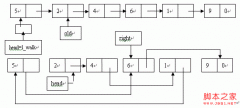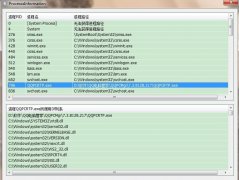解析c中stdout与stderr容易忽视的一些细节
本篇文章是对在c语言中stdout与stderr容易忽视的一些细节进行了详细的分析介绍,需要的朋友参考下
先看下面一个例子
a.c :
int main(int argc, char *argv[])
{
fprintf(stdout, "normal\n");
fprintf(stderr, "bad\n");
return 0;
}
$ ./a
normal
bad
$ ./a > tmp 2>&1
$ cat tmp
bad
tmp
我们看到, 重定向到一个文件后, bad 到了 normal 的前面.
原因如下:
"The stream stderr is unbuffered. The stream stdout is line-buffered when it points to a
terminal. Partial lines will not appear until fflush(3) or exit(3) is called, or a newline
is printed. This can produce unexpected results, especially with debugging output. The
buffering mode of the standard streams (or any other stream) can be changed using the
setbuf(3) or setvbuf(3) call. "
因此, 可以使用如下的代码:
int main(int argc, char *argv[])
{
fprintf(stdout, " normal\n");
fflush(stdout);
fprintf(stderr, " bad\n");
return 0;
}
这样重定向到一个文件后就正常了. 但是这种方法只适用于少量的输出, 全局的设置方法还需要用 setbuf() 或 setvbuf(), 或者采用下面的系统调用:
int main(int argc, char *argv[])
{
write(1, "normal\n", strlen("normal\n"));
write(2, "bad\n", strlen("bad\n"));
return 0;
}
但是尽量不要同时使用 文件流 和 文件描述符,
"Note that mixing use of FILEs and raw file descriptors can produce unexpected results and
should generally be avoided. A general rule is that file
descriptors are handled in the kernel, while stdio is just a library. This means for exam-
ple, that after an exec(), the child inherits all open file descriptors, but all old
streams have become inaccessible."
a.c :
代码如下:
int main(int argc, char *argv[])
{
fprintf(stdout, "normal\n");
fprintf(stderr, "bad\n");
return 0;
}
$ ./a
normal
bad
$ ./a > tmp 2>&1
$ cat tmp
bad
tmp
我们看到, 重定向到一个文件后, bad 到了 normal 的前面.
原因如下:
代码如下:
"The stream stderr is unbuffered. The stream stdout is line-buffered when it points to a
terminal. Partial lines will not appear until fflush(3) or exit(3) is called, or a newline
is printed. This can produce unexpected results, especially with debugging output. The
buffering mode of the standard streams (or any other stream) can be changed using the
setbuf(3) or setvbuf(3) call. "
因此, 可以使用如下的代码:
代码如下:
int main(int argc, char *argv[])
{
fprintf(stdout, " normal\n");
fflush(stdout);
fprintf(stderr, " bad\n");
return 0;
}
这样重定向到一个文件后就正常了. 但是这种方法只适用于少量的输出, 全局的设置方法还需要用 setbuf() 或 setvbuf(), 或者采用下面的系统调用:
代码如下:
int main(int argc, char *argv[])
{
write(1, "normal\n", strlen("normal\n"));
write(2, "bad\n", strlen("bad\n"));
return 0;
}
但是尽量不要同时使用 文件流 和 文件描述符,
代码如下:
"Note that mixing use of FILEs and raw file descriptors can produce unexpected results and
should generally be avoided. A general rule is that file
descriptors are handled in the kernel, while stdio is just a library. This means for exam-
ple, that after an exec(), the child inherits all open file descriptors, but all old
streams have become inaccessible."
精彩图集
精彩文章





